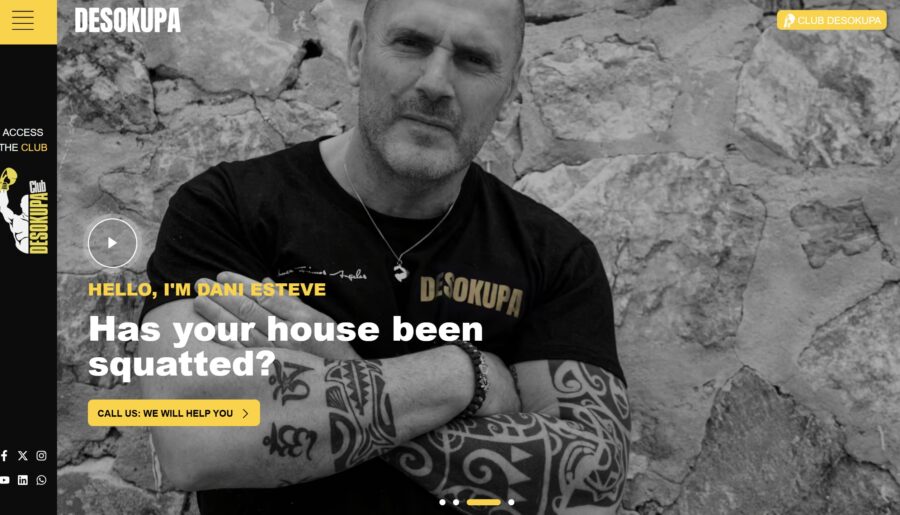NordenBladet – Planning to buy property in Spain? Is it really such a good idea or investment? Interest among Scandinavians in Spanish real estate decreases year by year, as property owners are increasingly forced to turn to private companies to evict both defaulting tenants and illegal occupants — known locally as okupas. In some countries, such as France, the use of private firms to persuade squatters to leave a property is prohibited.
Most illegal occupants are Spanish families or foreigners struggling to make ends meet and with nowhere else to go. But is a person who has legally purchased property always wealthy enough to be “taken advantage of” in this way? Not necessarily — there are many for whom the property in question is not a second home used only in winter. The issue also arises for permanent residents when the owner simply wishes to travel and leave the home temporarily.
FRANCE 24 journalists Maude Petit-Jové and Sarah Morris provide an overview in the video below of the methods private companies employ to assist property owners:
NordenBladet investigated: how exactly do these private companies protect property owners?
In Spain, private companies offer services to property owners aimed at removing unwanted tenants or okupas (people living illegally in a property). This phenomenon is closely tied to Spain’s deepening housing crisis.
The most well-known player in the market is Desokupa, founded by former skinhead Daniel (Dani) Esteve. The company is highly controversial in Spain: popular among property owners, yet strongly criticized by human rights organizations and left-wing political parties.
The companies justify their actions by saying: “If the state does not protect the owner quickly enough, then we will.”
Their activities typically include:
Negotiations and pressure tactics – companies send staff to the property to persuade tenants or squatters to leave voluntarily. In some cases, they even offer financial compensation in exchange for vacating the premises.
Intimidating presence – some firms, such as the notorious Desokupa, are known for their forceful and menacing methods. They often arrive in large groups, with athletic men dressed in black, sometimes accompanied by dogs or a security-like presence. Although they claim not to use physical violence, their mere presence is often intimidating enough to make squatters leave.
Constant presence – some companies send staff to stand guard outside a house or apartment so that the squatters feel uncomfortable and eventually give up living there.
Legal assistance – certain firms help owners initiate legal proceedings or speed up the process, since in Spain official evictions can take months or even years.
Grey area – although physical violence is illegal, critics argue that these methods often border on intimidation.
Does the supposed solution also have a dark side? Spanish investigative journalism suggests that in some cases there may be a double game at play.
While there is currently no confirmed evidence that private companies themselves directly organize occupations (autookupación) in order to create a problem and then sell the solution, Spanish media and politicians have repeatedly raised suspicions that some eviction firms may operate in this way:
* first, they allegedly allow or arrange for “their own people” to move into the property,
* then they offer the desperate owner a paid service to “remove the squatters.”
Evidence is difficult to confirm, as these practices operate in a grey area and direct cases are hard to prove. Some Spanish journalistic investigations (such as eldiario.es and La Vanguardia) have pointed to situations where the same individuals were linked both to being inside a property as “okupas” and later to “coming to the rescue.” In addition, allegations have been made that some company employees, or people associated with them, have ties to far-right groups known for using forceful or intimidating tactics.
Thus — although not officially confirmed — there is a plausible narrative that in some situations such a scheme could indeed take place: first a problem is artificially created, and then a solution is sold.
One way or another, the situation hardly brings peace of mind to property owners.
In the Spanish context, two different phenomena are distinguished:
-
Okupas – people who move into vacant properties without any rental contract.
-
Defaulting tenants (inquilinos morosos) – tenants who initially had a legal contract but stopped paying rent and refuse to leave.
How often does the situation arise where “one leaves – another immediately moves in”?
There are no precise statistics on how often, after the eviction of a tenant or squatters, a new occupier quickly takes their place. Such cases are not officially recorded.
However, Spanish property portals and legal experts warn that this is a real risk, especially in major cities (Barcelona, Madrid, Valencia), where rental and purchase prices are high.
It happens most often with empty apartments that have no active tenant or owner in residence — for example, when a property is up for sale or tied up in inheritance proceedings. If eviction is delayed, or the property is left unattended even for a few days, new squatters can easily move in.
How do owners try to prevent repeat occupations?
-
Private companies (such as Desokupa) – in addition to evictions, they also offer monitoring services: 24/7 surveillance or alarm systems to prevent re-entry.
-
Property insurance – in Spain, special “anti-okupa” insurance policies are available, covering legal expenses and sometimes even security costs.
-
Physical security measures – immediately after eviction, locks are changed, reinforced doors installed, cameras set up, or a security firm is contracted for temporary on-site presence.

Photo: Screenshot from Desokupa.com homepageWhere to seek help? A list of the best-known companies assisting property owners in Spain:

